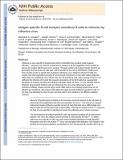Antigen-specific B-cell receptor sensitizes B cells to infection by influenza virus
Author(s)
Dougan, Stephanie K.; Ashour, Joseph; Karssemeijer, Roos A.; Popp, Maximilian W.; Avalos, Ana M.; Barisa, Marta; Altenburg, Arwen F.; Ingram, Jessica R.; Cragnolini, Juan J.; Guo, Chunguang; Alt, Frederick W.; Jaenisch, Rudolf; Ploegh, Hidde; ... Show more Show less
DownloadJaenisch_Antigen-specific.pdf (1.314Mb)
OPEN_ACCESS_POLICY
Open Access Policy
Creative Commons Attribution-Noncommercial-Share Alike
Terms of use
Metadata
Show full item recordAbstract
Influenza A virus-specific B lymphocytes and the antibodies they produce protect against infection. However, the outcome of interactions between an influenza haemagglutinin-specific B cell via its receptor (BCR) and virus is unclear. Through somatic cell nuclear transfer we generated mice that harbour B cells with a BCR specific for the haemagglutinin of influenza A/WSN/33 virus (FluBI mice). Their B cells secrete an immunoglobulin gamma 2b that neutralizes infectious virus. Whereas B cells from FluBI and control mice bind equivalent amounts of virus through interaction of haemagglutinin with surface-disposed sialic acids, the A/WSN/33 virus infects only the haemagglutinin-specific B cells. Mere binding of virus is not sufficient for infection of B cells: this requires interactions of the BCR with haemagglutinin, causing both disruption of antibody secretion and FluBI B-cell death within 18 h. In mice infected with A/WSN/33, lung-resident FluBI B cells are infected by the virus, thus delaying the onset of protective antibody release into the lungs, whereas FluBI cells in the draining lymph node are not infected and proliferate. We propose that influenza targets and kills influenza-specific B cells in the lung, thus allowing the virus to gain purchase before the initiation of an effective adaptive response.
Date issued
2013-10Department
Massachusetts Institute of Technology. Department of Biology; Whitehead Institute for Biomedical ResearchJournal
Nature
Publisher
Nature Publishing Group
Citation
Dougan, Stephanie K., Joseph Ashour, Roos A. Karssemeijer, Maximilian W. Popp, Ana M. Avalos, Marta Barisa, Arwen F. Altenburg, et al. “Antigen-Specific B-Cell Receptor Sensitizes B Cells to Infection by Influenza Virus.” Nature 503, no. 7476 (October 20, 2013): 406–409.
Version: Author's final manuscript
ISSN
0028-0836
1476-4687